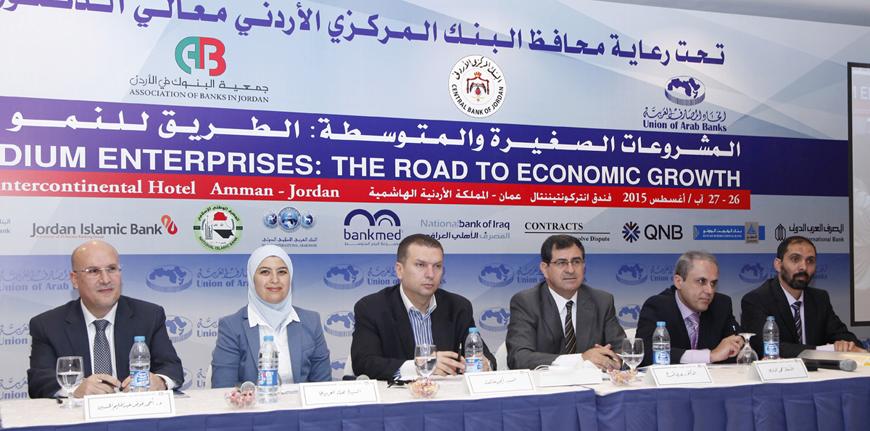You are here
Jordan’s banking system added value of 84% fuels national economy — ABJ
By Maria Weldali - Dec 04,2023 - Last updated at Dec 04,2023

Director General of the Association of Banks in Jordan (ABJ) Maher Mahrouq on Monday during a press briefing that saw the launch of an ABJ study (Photo courtesy of ABJ)
AMMAN — Jordan’s banking system is at the forefront in terms of added value, with 84 per cent of its operational processes generating tangible added value and direct contribution that fuels the national economy, said Director General of the Association of Banks in Jordan (ABJ) Maher Mahrouq on Monday.
Mahrouq’s remarks came during a press briefing that saw the launch of an ABJ study aimed at analysing the local banking system’ contribution to national economic activity and growth.
Confirming positive long-term effect of banking development on Jordan’s economy, the detailed study which is based on 2022 data, explores the banking sector’s contribution to GDP, and its role in the multiple economic sectors.
There are currently 20 banks operating in the Kingdom, 15 of which are local banks. They operate through 865 branches across the country, according to Mahrouq, who added that “there are approximately 2,200 automated teller machines [ATMs] across Jordan… this helps foster financial inclusion and expand the base of the banking apparatus which enables the delivery of banking services to the widest spread of geographical area”.
The 20 financial institutions include: Twelve Jordanian commercial banks, four foreign commercial banks, one foreign Islamic bank and three local Islamic banks, according to the study which also added that the financial inclusion ratio reached 50 per cent.
Mahrouq affirmed the private sector’s increased dependency on bank financing, noting that the Kingdom’s banking sector is among the most resilient globally.
The capital adequacy ratio is 17.1 per cent and the net credit granted to the central government stands at JD12 billion, according to the study which found that 47 per cent of local banking sector’ shares are owned by Arab investors.
Regarding the banking sector’s contributions to the Jordanian economy, Mahrouq said that credit facilities granted by banks accelerated local economic growth, highlighting that increasing credit facility by 10 per cent boosted the GDP by up to 2.7 per cent.
The 10 per cent increase in credit facilities has increased the added value by approximately 5.6 per cent in commercial, tourism, hotel and restaurant sectors.
With banks being more involved in supporting small and medium enterprises (SMEs), Mahrouq underscored that the lines of credit have supported the sustainability and growth of SMEs which he described as “key growth and employment engines” in the local economy.
Highlighting the local banking system’s financial evolution, the ABJ director general said that “when looking at the banking industry’s total assets [net of cash holdings], which are approximately JD65 billion, we see that they represent 194 per cent of the GDP”.
This implies that the overall banking assets are twice the size of the local economy, he noted.
As for the sector’s return on asset ranking, the banking sector ranked sixth in comparison with other sectors in Jordan, the study showed.
The study presented the bank’s progress in increasing economic inclusiveness, safeguarding assets and bringing a value-added service for the local economy.
The local banking system is a subsector of the financial services industry, which constitutes 97 per cent of the wider financial markets’ sector, Mahrouq said.
Mahrouq explained that the decline in operational banks in Jordan is due to bank mergers which serve as a positive indicator for the banking sector, noting that “well-established, resilient and capable of supporting inclusive and sustainable development”.
The bank deposits to GDP and the credit-to-GDP ratio reached 129 per cent, and 99 per cent, respectively, according to the study.
“The magnitude of banking facilities is nearly the size of GDP... this shows us that credit facilities have increased economic growth,” he said.
The study also indicated that the Jordanian banking sector contributed approximately JD277 million in income taxes for the year 2022, representing 20 per cent of the total taxes collected, and thereby being “the largest taxpayer in Jordan”, he noted.
Hestressed the large volume of foreign investment in local banks which stands at approximately 56 per cent of the total banks listed in the Amman Financial Market.
The banking sector is a major employer in the Kingdom, 22,400 Jordanians are employed in the sector, where 35 per cent are women, and 74 per cent are under the age of 40, the study showed.
Related Articles
AMMAN — Prime Minister Bisher Khasawneh on Tuesday attended the launch of the Association of Banks in Jordan’s (ABJ) second initiative to su
AMMAN — About 60 per cent of banks present in Jordan operate departments specialised in financing small- and medium-sized enterprises (SMEs)
AMMAN — In a step towards improving financial awareness in Jordan, the Association of Banks in Jordan (ABJ) on Tuesday launched the Kingdom’














